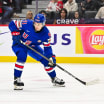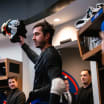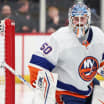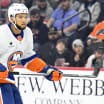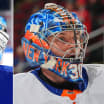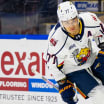That Bill Torrey could manage to draft a scoring prodigy such as Mike Bossy as late as the 15th-overall pick in the 1977 Entry Draft was astonishing in and of itself. Truly miraculous, many hockey people said as Bossy later would dash hellbent through a Hall of Fame career.
On the other hand, Bossy was not pleased with his relatively low selection, considering his sensational junior career with Laval.
"It hurt my pride to go only 15th in the Draft," Bossy admitted. "But it did teach me a lesson; now I knew that I had to work on all aspects of my game; not just scoring."
Maven's Memories: Bossy Scores 50 in Rookie Year
Mike Bossy made a bold promise before he ever played an NHL game - and delivered on it
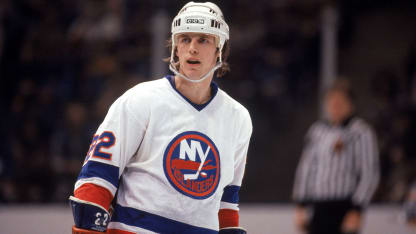
© B Bennett/Getty Images
By
Stan Fischler
Special to NHL.com
But that was only the Draft; it did not make Bossy an "official" member of the Islanders. Now Bow Tie Bill had to sign this potential ace and Torrey knew that he had competition. Big time!
With the World Hockey Association still actively competing with the National Hockey League -- and regularly purloining its players -- the WHA's Quebec Nordiques made a substantial offer for Bossy.
In fact the Nordiques offered a larger signing bonus and significantly more guaranteed money. What's more, Quebec City was a French-speaking city and Mike's wife-to-be, Lucie, was a French-Canadian who then spoke little English.
RELATED: HOW BOSSY FELL TO THE ISLANDERS
Torrey was in trouble and knew it. He wanted to up the ante but he had to be sure that it was the right move. "How many goals do you think you can score for us?" the general manager asked his hoped-for prospect.
Unhesitatingly, Bossy shot back, "Fifty!"
Bow Tie Bill could have been excused if he had fainted on the spot.
No, Torrey did not pass out. He gulped and then added to his offer -- still not as much as Quebec's -- and told Mike to make a decision. Meantime the Nordiques slapped a deadline on their bid and now it was time for the Kid to make his move.
Bossy: "I took a long walk and began thinking. The WHA was on its last legs; its talent was not up to NHL standards nor was some of its arenas. The new league's championship trophy was called The Avco Cup; not the Stanley Cup.
"I thought about how I had dreamed of playing in the NHL," Mike wrote in his autobiography, Boss. "I thought about the Stanley Cup. I wanted to prove the scouts wrong by becoming an all-around great pro; a complete player.
"If I did that in the vastly inferior WHA the skeptics would still raise debates," Bossy added. "I had to play against the best in the NHL. I decided to become a New York Islander."
Bossy put his John Hancock on Torrey's contract on Friday, got married on Saturday and on Sunday flew to the Bahamas for his honeymoon with Lucie. As he would prove later in the NHL, The Kid didn't fool around.
Torrey would never forget Bossy's 50-goal promise nor would Mike. It was a fact of Islanders history that none of the previous Nassaumen had ever scored 50 goals. Furthermore, no NHL rookie ever had accomplished that feat.
Not surprisingly, Bossy was the talk of training camp in the fall of 1977. Interestingly, most reporters believed that he was French-Canadian because he had played for Laval, a francophone Junior team, and he was known there as Michel Bossy; not Mike.
The media, therefore, was pleased to know that he spoke fluent English. The newsmen also were impressed with his oozing confidence.
Bossy: "I think I can be a better player with the Islanders than I was in Junior. I'm not saying I can score 75 goals but I can score half as many and even more if I can adjust to the Islanders style."
How Mike fit into coach Al Arbour's scheme of things still had to be determined. Radar did some deep thinking. He was satisfied -- but not overly so -- with Billy Harris on right wing with Bryan Trottier and Clark Gillies. Suddenly, Radar had a brainstorm.
"I decided to put Boss' in Billy's spot," allowed Arbour, "just to see how they fit at training camp."
Who could have known?
The mix was as perfect as gin with tonic; bacon and eggs; steak with potatoes. From Game One in Buffalo and thereafter, goals by Bossy came as easy as picking cherries off a tree.
"Scoring 50 goals was in my mind from Opening Night," Bossy remembered. "I scored once in our first game and once in our second."
Faster than you can say, "What have we here?" Mike had tallied five goals in the club's first nine games and had soared to the top in team scoring. That included the winner in a 4-2 edge over Buffalo at the Coliseum on October 27, 1977.
(I remember that date well because before the contest, I had been asked to interview Mike, pre-game, at center ice. Knowing that the Quebec papers always called him "Michel," I figured that he was French-Canadian and that the interview would be a challenge for me. When I discreetly asked Mike if he spoke English, he softly told me he was not a French-Canadian and, in fact, was perfectly bilingual.)
Other media types took a bit longer to realize that Bossy was part Ukranian and part British. Finally, he cornered the club's publicist, Hawley Chester III, and insisted that his name was not Michel.
"It's Michael -- M-I-C-H-A-E-L!"
Of course, both Trottier and Gillies already knew that, and were aware that they had found a right wing with whom they delightfully could play for the next decade.
"It's all in the blend," Arbour enthused. "Those kids complement each other perfectly."
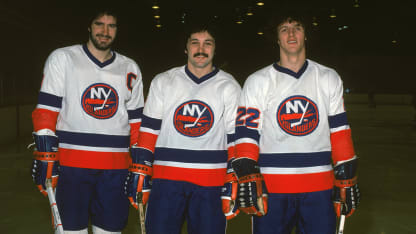
© B Bennett/Getty Images
Gillies' size and corner work was both impeccable and intimidating. Trottier, who had blossomed into the league's best center, played every aspect of the game to perfection.
"Bossy," Arbour added, "is ultra-dangerous in front of the net. His hands are like lightning and he has a great instinct for the puck. He's also one of the hardest workers on the club."
Arbour's phrase, "One of the hardest workers," was roughly translated to mean that Mike had fulfilled his challenge. He learned how to backcheck; a solid defensive game had become part of the sniper's repertoire.
Without question, Arbour -- alias Radar -- had become one of the most beloved and well as most respected coaches in the league. Part of his attraction to Bossy was Al's sense of humor and his acceptance of his nickname.
"Al always, always seemed to know what was going on," explained Bossy, "and I loved the fact that he could take a joke because I always was joking around with my buddy, Trots."
Exhibit A in terms of players kidding with Radar was a scene on the team bus after the Isles had drubbed the Flyers in Philly. Someone had produced a hand-drawn picture of Al as a Star Wars robot.
In the drawing, an antenna emanated from Radar's head with a scoreboard reading, 7-0, favor of Isles and it showed one second remaining in the game. The "balloon" from Arbour's mouth said, "Howie (Garry Howatt) take a half-a-shift!"
Bossy: "When we showed it to Al, he couldn't suppress a broad grin."
Mike kept laughing as his scoring figures swelled toward the second half of the campaign. On February 22, 1978, he scored goals 43rd and 44th, which tied Rick Martin's NHL rookie goal-scoring mark. It thrust Bossy far ahead in the Calder Memorial Trophy race.
By this point, Boss could expect a posse of newsmen surrounding his locker after big games and his record-tying performance was no exception. Naturally, reporters asked the standard questions that Mike had been hearing so often, and which bored him: "How do you do it?"
Bored by the redundancies, Mike suggested that he be asked a different question. The newsmen agreed and the little dialogue went like this:
Reporter: "What color shirts do you wear -- red ones?"
Mike: "Yeah, they remind me of the goal light."
Second Reporter: "What kind of shirts do you wear?"
Mike: "Cheap ones!"
End of interview.
There was nothing cheap about Bossy in the homestretch of 1977-78. Every opponent now was aware of his multi-talents and assigned its most gifted -- often ferocious, often dirty -- checkers to stifle him. Mike frankly allowed that the intimidation strategy sometimes worked.
That said, with eight games remaining in the campaign, Boss was only one goal away from his coveted 50th red light. But then he struck out -- in order -- against Toronto, Cleveland, Minnesota and the Rangers.
"I admit," he later confessed, "that I started to get nervous that I might miss it after all."
He didn't.
In Game 76 on April 15, 1978 he beat Washington Capitals goalie Bernie Wolfe on the power play after being set up by Denis Potvin and Trots. Celebrating his landmark score, Mike did what he called "a neat little two-step" on the ice.
Nobody seemed to mind and in the tumultuous Islanders dressing room, Mike explained that his jig not only was a personal salute to himself but it almost assured the Isles of first place.
"Hey," he said, "if we get in first, it means that we would get a 'bye' in the opening round."
The cherry on his record-breaking cake was placed on April 8th when he tallied his 53rd goal of the season, enabling his mates to clinch the NHL title.
With a big stogey in his mouth and an even larger smile crossing his face, Bill Torrey was a portrait of joy standing at the glass, watching his team crest toward the top.
After all, the 15th pick in the 1977 Draft had done what no other rookie had done, he scored 50 goals, as promised, and gifted Bow Tie Bill with three more as a bonus!
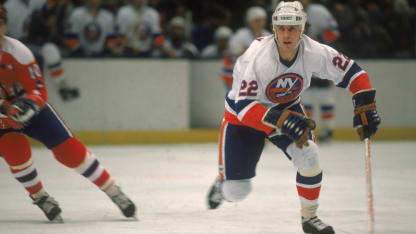
© B Bennett/Getty Images
LISTS: SIX REASONS WHY BOSSY WAS ABLE TO DO WHAT NO OTHER ROOKIE HAD DONE:
1. MOTIVATION:Having promised Torrey that he would get 50 goals in his maiden season, Bossy was super-inspired to make good on his promise.
2. ARBOUR'S CHOICE: Who knows what would have happened if Coach Al had decided to keep Billy Harris on the top line instead of Boss. But Radar took the gamble and it paid off.
3. THE LINEMATES:Mike would be the first to tell you that he never would have hit the jackpot without the combined aid provided by Clark Gillies and Bryan Trottier.
4. GUTS:To face notorious goons such as Tiger Williams and Dave Hoyda on a regular basis and stand up to them required extraordinary courage. Bossy had it -- in spades.
5. EGO:In order to be a champion, you have to believe in yourself and your ability. Denis Potvin had that gift and Mike would tell you that his ego was not in the "Small" category either.
6. VERSATILITY: In order to stay in Arbour's good graces Bossy had to learn defense; which he did; as he vowed that he would.

